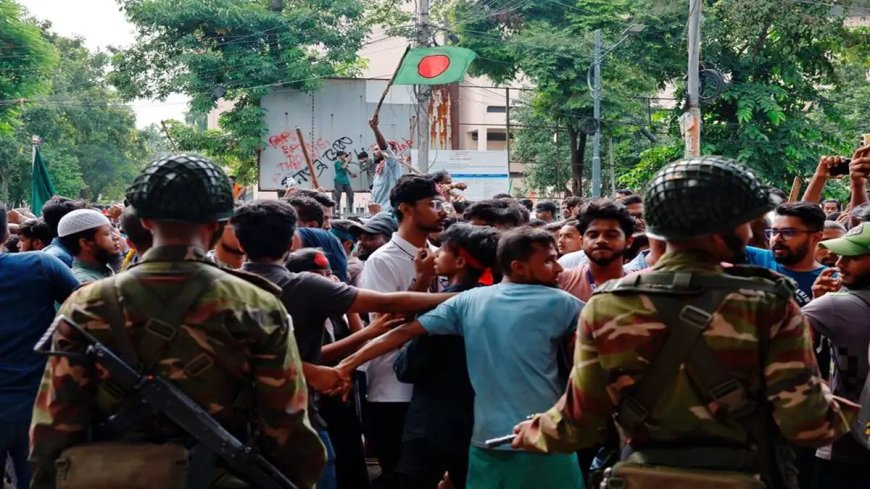"Is Conflict Looming? Bangladesh's Military Expansion, Rising India Tensions, and Unrest Among Myanmar Rebels"
"Is Conflict Looming? Bangladesh's Military Expansion, Rising India Tensions, and Unrest Among Myanmar Rebels"

Revised Version:
In recent months, South Asia has been increasingly fraught with uncertainty, as rising tensions in Bangladesh hint at potential regional escalation. The interim government led by Mohammad Yunus has strengthened ties with Pakistan, while the Arakan Army in Myanmar expands its influence near Bangladesh’s borders, fueling concerns of an imminent conflict. Against this backdrop, critical questions arise: Is Bangladesh preparing for war? If so, who is the likely adversary?
Bangladesh has intensified its military buildup in recent months, sparking widespread speculation. During a recent military exercise in Chittagong, interim leader Mohammad Yunus urged the Bangladesh Army to prepare for war, emphasizing constant vigilance to protect national sovereignty. This call aligns with the military’s ongoing efforts to modernize its forces. These exercises, which featured tanks, helicopters, and artillery, serve not only as routine drills but also as a message to both domestic and international audiences. Yunus’ remarks, framed within this broader geopolitical context, raise questions about the country’s strategic objectives.
A Diplomatic Shift: Bangladesh and India
While Yunus emphasizes military readiness, his government’s diplomatic moves suggest a significant shift. A notable example is Bangladesh’s acquisition of Turkish-made light tanks, reportedly intended for deployment along the Indian border. The choice of the ‘Otokar Tulpar’ tanks—previously linked to conflict zones and terrorist groups—has heightened Indian concerns. Compounding this is the Yunus administration’s abrupt cancellation of a planned judicial training program in India, originally meant to foster closer judicial cooperation. The cancellation, attributed to administrative reasons, signals a cooling of bilateral relations amidst rising anti-India sentiment in Bangladesh. This pivot towards Pakistan and away from India has raised alarms in New Delhi about the future trajectory of bilateral ties.
General Waqar Uz Zaman: A Moderate Voice
Amid the interim government’s aggressive stance, Bangladesh’s Army Chief, General Waqar Uz Zaman, has emerged as a voice of moderation. Despite political turmoil and the government’s warming relations with Pakistan, Zaman has consistently advocated for maintaining strong ties with India. In several statements, he underscored Bangladesh’s commitment to respecting India’s strategic interests, highlighting the economic and regional interdependence between the two nations.
However, Zaman’s position is not without complications. His involvement in the political upheaval that ousted Sheikh Hasina, along with suspicions of divided loyalties, has cast a shadow over his conciliatory approach. With Yunus pursuing a more confrontational stance, the growing divergence between military leadership and government policy could exacerbate instability.
The Arakan Army: A Growing Border Threat
Adding to Bangladesh’s challenges is the escalating threat from Myanmar’s Arakan Army, a rebel group that has gained significant ground near Bangladesh’s border. Recently, the Arakan Army captured the strategic town of Maungdaw, near Cox’s Bazar, intensifying border security concerns. The rebel group’s collaboration with other insurgent factions could further destabilize Myanmar’s Rakhine state and pose cross-border security risks for Bangladesh.
Bangladesh’s security forces, already stretched thin by internal unrest, now face the prospect of managing a volatile border situation. The growing influence of the Arakan Army and its proximity to Bangladesh raise the risk of insurgent activity spilling over, adding another layer of complexity to the country’s security landscape.
Navigating a Diplomatic Crossroads
Caught between deepening ties with Pakistan and fraying relations with India, Bangladesh finds itself at a pivotal juncture. Relations with India have soured over the past year, exacerbated by concerns over religious minority rights and the extradition request for Sheikh Hasina. Yet, despite rising tensions, some efforts at cooperation persist. For instance, both nations recently coordinated the repatriation of fishermen caught crossing maritime boundaries, signaling a desire to keep communication channels open.
However, with Bangladesh’s intensified military focus and its pivot towards Pakistan, such gestures may not suffice to reverse the deteriorating relationship with India. The region remains on edge, wary of further escalation.
A Fragile Balance: Is War on the Horizon?
The combination of military posturing, shifting alliances, and rising geopolitical tensions raises the specter of conflict, but it remains uncertain whether war is imminent. Bangladesh’s leadership, divided between the interim government and the military, must navigate a complex web of domestic challenges, external threats, and fragile regional dynamics.
As Myanmar’s insurgency adds to regional instability and Bangladesh’s military stance grows bolder, the question remains: can the country avoid a full-blown conflict? The coming months will be critical in determining whether these rising tensions escalate into war or subside into a tenuous peace. For now, the region watches, acutely aware of the high stakes and looming risks.
What's Your Reaction?





















































































